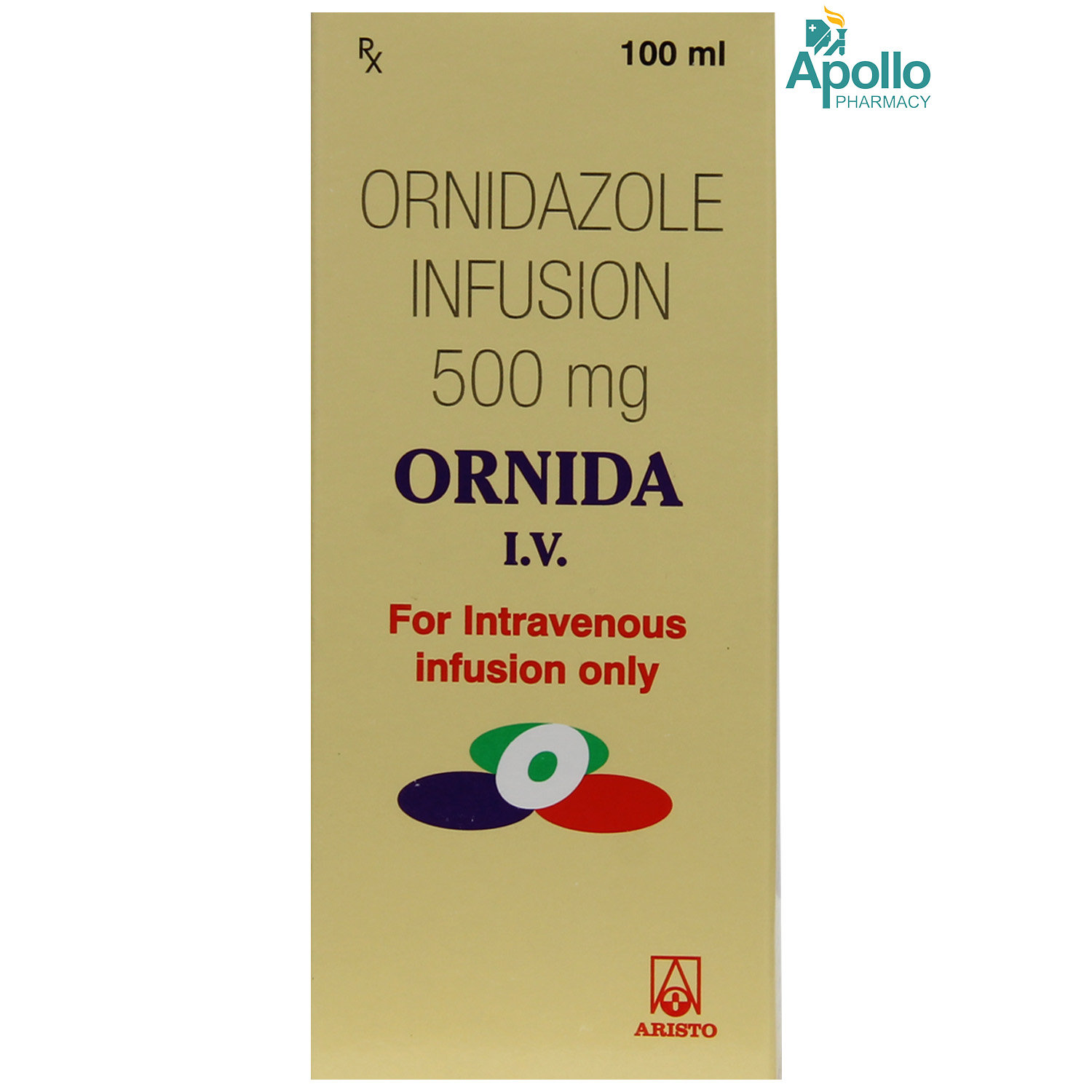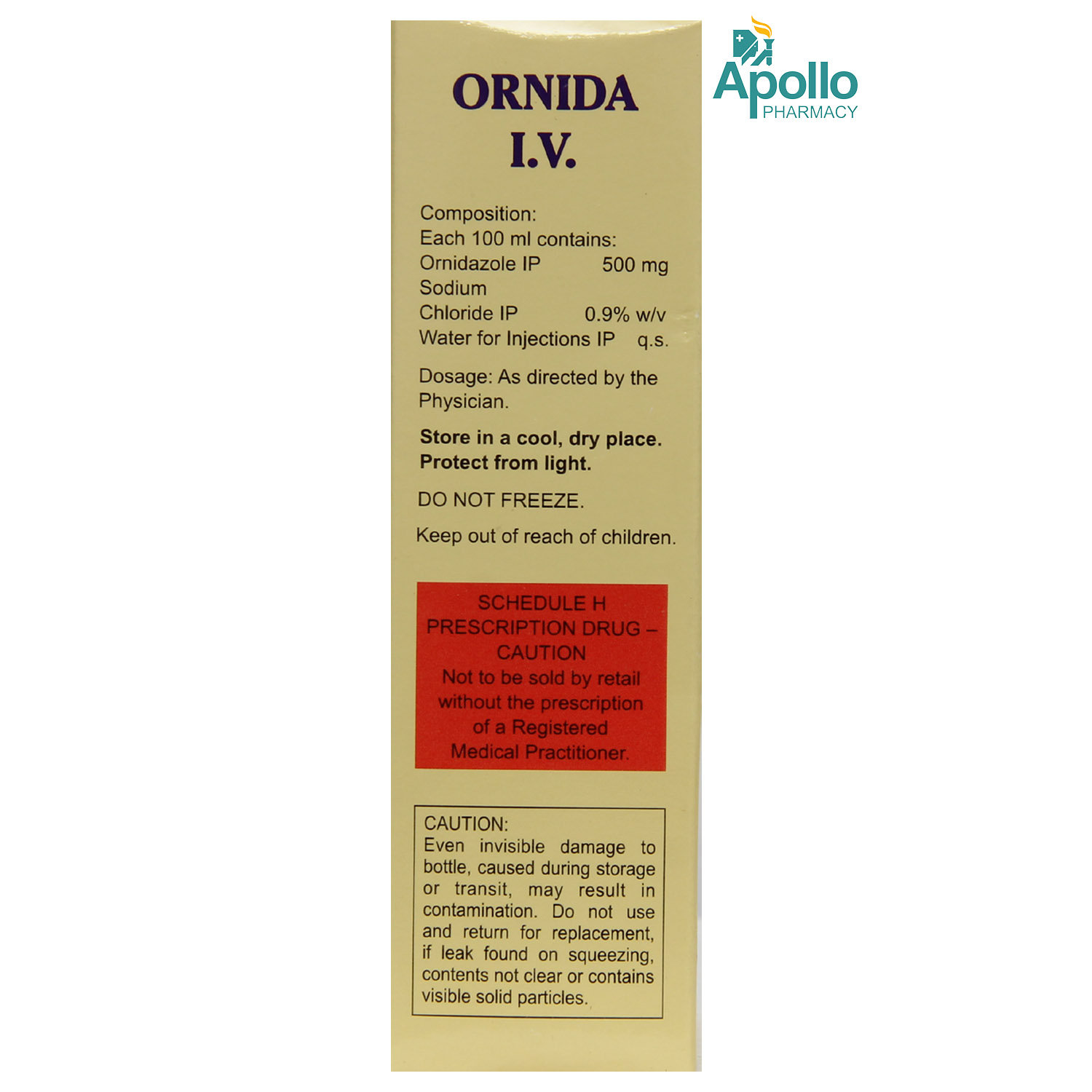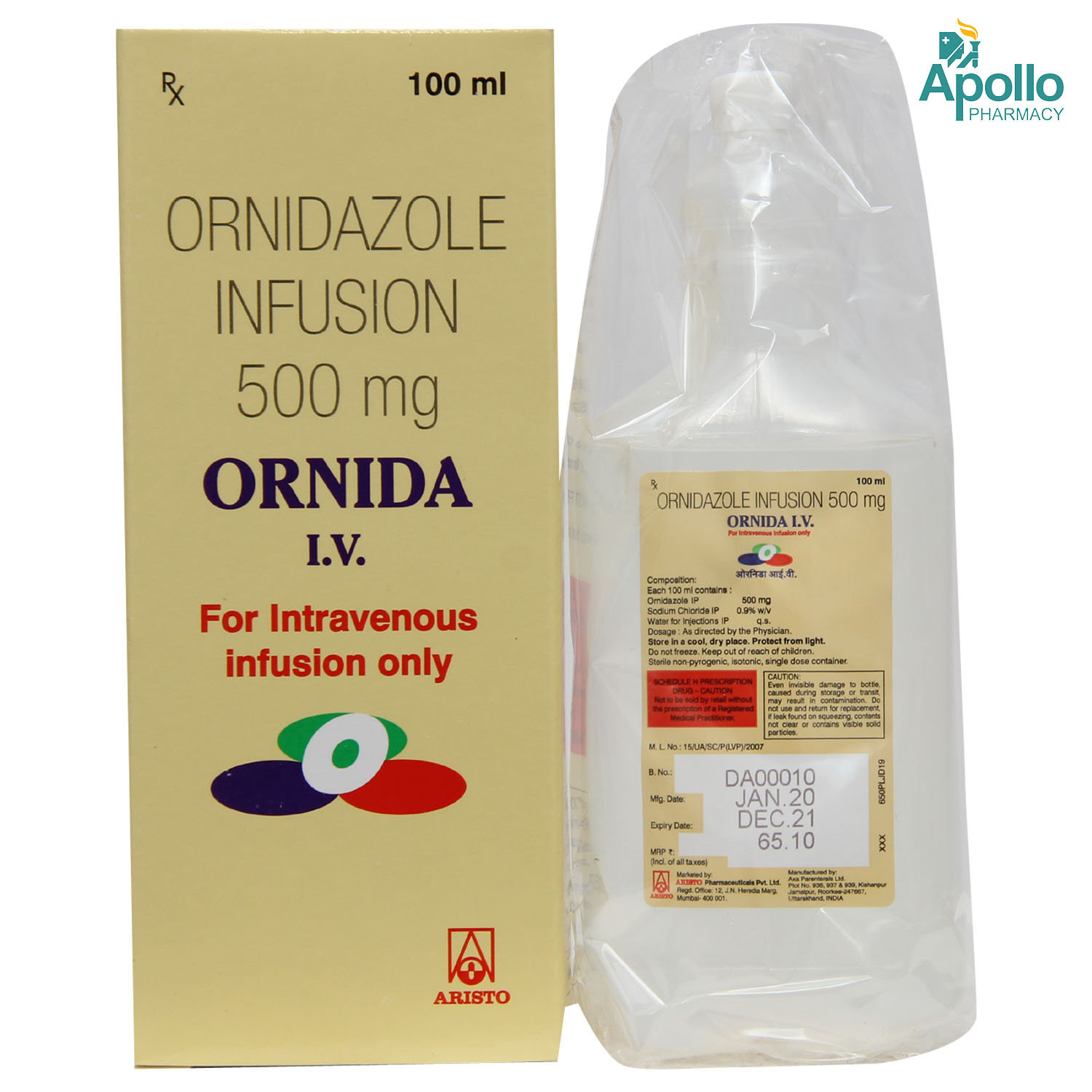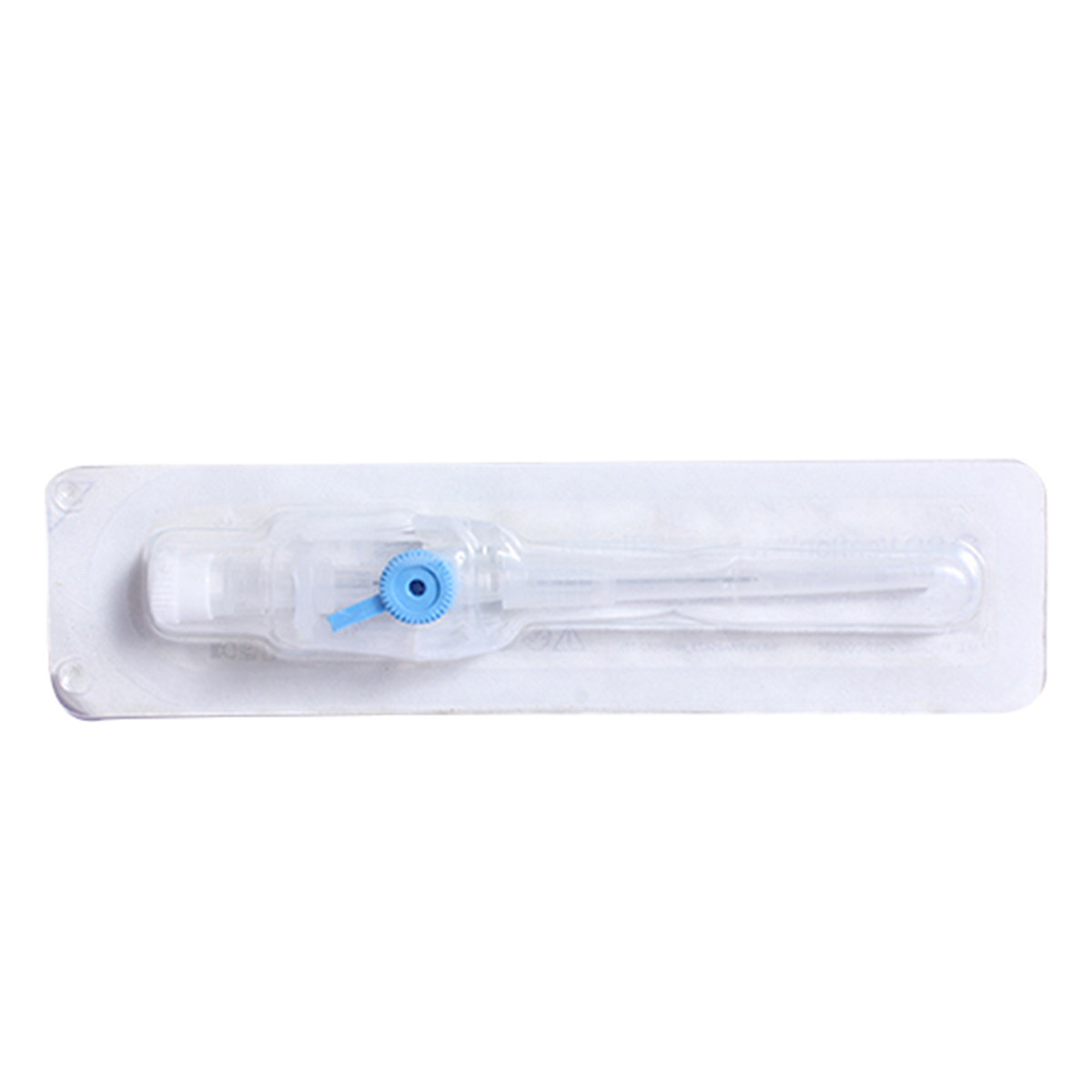Ornida IV Infusion



MRP ₹87
(Inclusive of all Taxes)
₹13.1 Cashback (15%)
know your delivery time
Provide Delivery Location
Composition :
Manufacturer/Marketer :
Consume Type :
Expires on or after :
Return Policy :

Secure Payment

Trusted by 8 Crore Indians

Genuine Products
Therapeutic Class
Country of origin
Manufacturer/Marketer address
Author Details
We provide you with authentic, trustworthy and relevant information
Disclaimer
Alcohol
Safe if prescribed
It is unknown if alcohol affects Ornida IV Infusion . Please consult a doctor.
Pregnancy
Consult your doctor
Ornida IV Infusion is considered safe to be used in pregnancy. However, if you are pregnant inform your doctor; your doctor will prescribe Ornida IV Infusion only if the benefits outweigh the risks.
Breast Feeding
Consult your doctor
Consult your doctor if you are breastfeeding. Your doctor will decide if Ornida IV Infusion can be taken by breastfeeding mothers or not.
Driving
Safe if prescribed
It is not known if Ornida IV Infusion affects your ability to drive. Drive or operate machinery only if you are alert.
Liver
Consult your doctor
Limited information is available. If you have liver impairment/liver disease, inform your doctor before taking Ornida IV Infusion . Your doctor may adjust the dose of this medicine or prescribe a suitable alternative based on your condition.
Kidney
Consult your doctor
Limited information is available. If you have kidney impairment/kidney disease, inform your doctor before taking Ornida IV Infusion . Your doctor may adjust the dose of this medicine or prescribe a suitable alternative based on your condition.
Children
Safe if prescribed
Limited information is available. Please consult a doctor if you have any concerns regarding the usage of Ornida IV Infusion in children.
Product Substitutes
About Ornida IV Infusion
Ornida IV Infusion belongs to a class of antibacterial medications called 'nitroimidazoles' primarily used to treat bacterial infections such as septicemia, meningitis, peritonitis, post-operative wound infections, post-natal sepsis, septic abortion, endometritis, and anaerobic systemic infections caused by ornidazole-sensitive microflora. It is also used to treat post-operative infections, severe intestinal amoebiasis, and giardiasis.
Ornida IV Infusion contains 'Ornidazole' that works by damaging the DNA of the infection-causing agent and inhibiting their growth. Thus, it treats infections. Ornida IV Infusion is indicated in the treatment of acute and severe infections or when oral administration is not possible.
In some cases, Ornida IV Infusion may cause common side-effects such as dry mouth, headache, loss of appetite, diarrhoea, nausea, and vomiting. Most of these side effects do not require medical attention and will resolve gradually over time. However, you are advised to talk to your doctor if you experience these side effects persistently.
Inform your doctor if you are allergic to any of the components in Ornida IV Infusion . Also, let your doctor know if you are pregnant or breastfeeding. Notify your doctor about your current list of medications, including over-the-counter products (vitamins, herbal supplements, etc.), allergies, pre-existing diseases, and current health conditions.
Uses of Ornida IV Infusion
Medicinal Benefits Mweb
Key Benefits
Ornida IV Infusion belongs to a class of antibacterial medications called 'nitroimidazoles' primarily used to treat bacterial infections such as septicemia (blood infection), meningitis (inflammation of the brain and spinal cord), peritonitis (inflammation of the membrane lining the abdominal wall and abdominal organs), post-operative wound infections, post-natal sepsis (bacterial infection of the uterus), septic abortion (abortion due to uterine infection), endometritis (inflammation of the uterine lining), and anaerobic systemic infections caused by ornidazole-sensitive microflora. It is also used to treat post-operative infections, severe intestinal amoebiasis (intestinal infection caused by Entamoeba histolytica), and giardiasis (intestinal infection caused by giardia parasite). Ornida IV Infusion works by damaging the DNA of the infection-causing agent and inhibiting its growth. Thereby, treating infections. Ornida IV Infusion is indicated in the treatment of acute and severe infections or when oral administration is not possible.
Directions for Use
Side Effects of Ornida IV Infusion
- Nausea
- Vomiting
- Dry mouth
- Headache
- Loss of appetite
- Diarrhoea
Drug Warnings
Do not take Ornida IV Infusion if you are allergic to any of its components. Inform your doctor about your current list of medications, including over-the-counter products (vitamins, herbal supplements, etc.), allergies, pre-existing diseases, and current health conditions. Consult your doctor before taking Ornida IV Infusion if you are pregnant or breastfeeding. Please consult a doctor if you have any concerns regarding the usage of Ornida IV Infusion in children.
Drug-Drug Interactions
Drug-Drug Interactions
Login/Sign Up
Drug-Food Interactions
Drug-Food Interactions
Login/Sign Up
Drug-Diseases Interactions
Drug-Diseases Interactions
Login/Sign Up
Habit Forming
Diet & Lifestyle Advise
- Antibiotics can alter the useful bacteria in the stomach, which help in digestion. Therefore, you are advised to take foods rich in probiotics such as yoghurt/curd, kefir, sauerkraut, tempeh, kimchi, miso, kombucha, buttermilk, natto and cheese.
- Eat fibre-rich food like whole grains, beans, lentils, berries, broccoli, peas and bananas.
- Avoid foods rich in calcium, grapefruit and grapefruit juice as they might hinder the absorption of antibiotics.
- Avoid consumption of alcohol and usage of tobacco.
All Substitutes & Brand Comparisons
RX
Out of StockOrnigyl IV Injection 100 ml
J B Chemicals & Pharmaceuticals Ltd
₹68
(₹0.61/ 1ml)
21% CHEAPER

Have a query?
Buy best Infections & Infestation products by
Cipla Ltd
Macleods Pharmaceuticals Ltd
Alkem Laboratories Ltd
Lupin Ltd
Abbott India Ltd
Sun Pharmaceutical Industries Ltd
Mankind Pharma Pvt Ltd
Micro Labs Ltd
Aristo Pharmaceuticals Pvt Ltd
FDC Ltd
Intas Pharmaceuticals Ltd
Glenmark Pharmaceuticals Ltd
Ipca Laboratories Ltd
Torrent Pharmaceuticals Ltd
Zydus Healthcare Ltd
Biochem Pharmaceutical Industries Ltd
Zuventus Healthcare Ltd
United Biotech Pvt Ltd
Hetero Drugs Ltd
Emcure Pharmaceuticals Ltd
Alembic Pharmaceuticals Ltd
Indoco Remedies Ltd
Fusion Health Care Pvt Ltd
Dr Reddy's Laboratories Ltd
Leeford Healthcare Ltd
Cadila Healthcare Ltd
Wockhardt Ltd
Zydus Cadila
GlaxoSmithKline Pharmaceuticals Ltd
Morepen Laboratories Ltd
Blue Cross Laboratories Pvt Ltd
Cadila Pharmaceuticals Ltd
Converge Biotech Pvt Ltd
Elder Pharmaceuticals Ltd
Hetero Healthcare Pvt Ltd
Pfizer Ltd
AAA Pharma Trade Pvt Ltd
Gufic Bioscience Ltd
Mylan Pharmaceuticals Pvt Ltd
Corona Remedies Pvt Ltd
Wallace Pharmaceuticals Pvt Ltd
Apex Laboratories Pvt Ltd
Medishri Healthcare Pvt Ltd
Akumentis Healthcare Ltd
Alniche Life Sciences Pvt Ltd
Hegde & Hegde Pharmaceutica Llp
Veritaz Healthcare Ltd
Ranbaxy Laboratories Ltd
Koye Pharmaceuticals Pvt Ltd
Shreya Life Sciences Pvt Ltd
Overseas Health Care Pvt Ltd
Biocon Ltd
Indchemie Health Specialities Pvt Ltd
Medley Pharmaceuticals Ltd
Brinton Pharmaceuticals Ltd
J B Chemicals & Pharmaceuticals Ltd
Unifaith Biotech Pvt Ltd
Ajanta Pharma Ltd
Biochemix Health Care Pvt Ltd
Natco Pharma Ltd
Samarth Life Sciences Pvt Ltd
Unichem International
Laborate Pharmaceuticals India Ltd
Unipark Biotech Pvt Ltd
Zymes Bioscience Pvt Ltd
Indiabulls Pharmaceuticals Pvt Ltd
Neon Laboratories Ltd
Vasu Organics Pvt Ltd
DR Johns Lab Pharma Pvt Ltd
East West Pharma India Pvt Ltd
La Renon Healthcare Pvt Ltd
Medgen Drugs And Laboratories Pvt Ltd
Novartis India Ltd
Canixa Life Sciences Pvt Ltd
Icarus Health Care Pvt Ltd
Lincoln Pharmaceuticals Ltd
Celon Laboratories Pvt Ltd
Concept Pharmaceuticals Ltd
Klm Laboratories Pvt Ltd
Nicholas Piramal India Ltd
Systopic Laboratories Pvt Ltd
Yuventis Pharmaceuticals
Capital Pharma
German Remedies Ltd
Pristine Pearl Pharma Pvt Ltd
Unison Pharmaceuticals Pvt Ltd
Aurz Pharmaceutical Pvt Ltd
Clover Health Care Pharma
Kepler Healthcare Pvt Ltd
Allites Life Sciences Pvt Ltd
Auspharma Pvt Ltd
Intra Life Pvt Ltd
Jolly Healthcare
Linux Laboratories Pvt Ltd
Ozone Pharmaceuticals Ltd
Cachet Pharmaceuticals Pvt Ltd
Comed Chemicals Ltd
Delcure Life Sciences Ltd
Fresenius Kabi India Pvt Ltd
Khandelwal Laboratories Pvt Ltd
Customers Also Bought

_0.jpg?tr=q-85)




